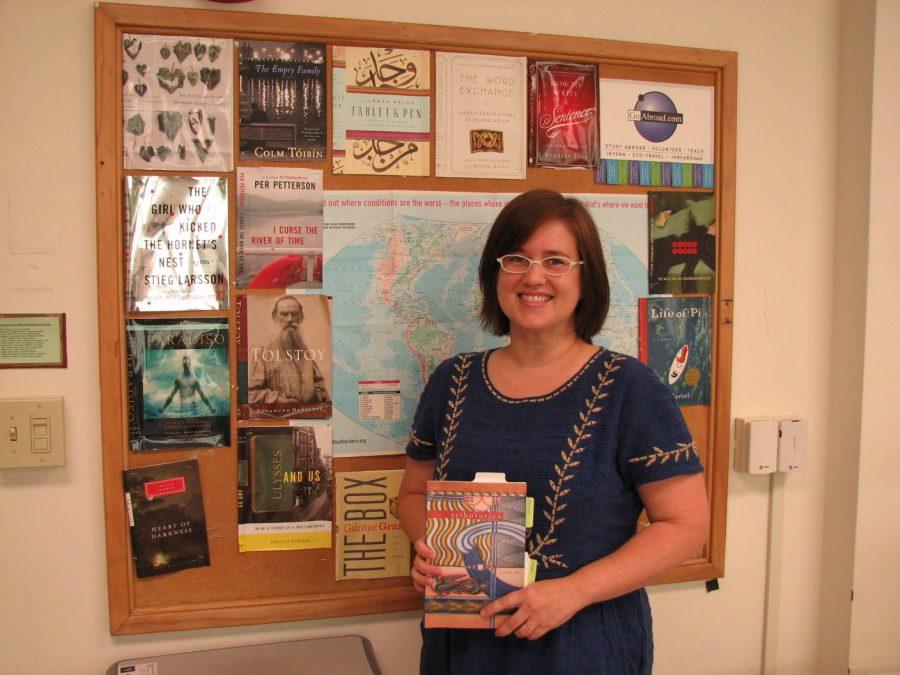Visiting poet inspires a class with her work
September 18, 2015
Laura Da, a poet visiting from Seattle, spoke to Professor Eric McHenry’s Poetry 101 class on Friday, Sept. 11 to share her experience as a poet and to read poems from her most recent book, “Tributaries.”
Da was invited to speak Saturday, Sept. 12 at the Fifth Annual Kansas Book Festival. She was chosen as a 2015 presenting author. Authors with recently published literature are invited to speak at the festival and must have some tie to Kansas— whether that be content in their work, being a Kansan or otherwise.
Da’s book is inspired by the idea of tributaries or branches. In the manuscript itself, there are mentions of the idea that one idea can become many. Another angle is that tributaries “contribute” as they flow in and out of the river, just as Da’s poems flow in and out of personal and historic perspectives.
Da connects to Kansas through her deep family ties with the Shawnee Tribe. Another connection to Kansas are her grandparents, who originally met at Haskell Indian Nations University in Lawrence, Kan. The poetry describes an antiquated look at Shawnee Tribe history and traditions, narratives and perspectives and imagery of Midwestern landscapes. Da says she has a greater understanding of social justice, people and race, through her writing, including content about those subjects in her writing.
“My writing has an element of provoking the thought; I like causing a bit of discomfort for the reader,” says Da.
In the past, the poetry community has referred to Da as a hybrid poet, because she writes with a somewhat narrative style. Her writing is intuitive and intentional, some of her knowledge gleaned from oral family tradition. Da grew up on a reservation in a tribal setting. Tension exists in different sides of her cultural heritage, tracing back to days of her ancestors.There are still identity conflicts within native communities, as tribes move into modern day with other groups that are in the minority.
Indigo Wilson-Schmidt, sophomore English major, said it was reassuring that Da found poetry a little later in life.
“I like that she was our age when she really discovered poetry,” said Wilson-Schmidt.
Da thinks poetry is one of the few areas where you can take advantage of writing in abstract structures. She has tried to write prose, but always come back to poetry.
“I found poetry as a fantastic fit. I don’t tether well to linear structure. I feel most satisfied with my expressions as a poet,” said Da.
The Native American community has influenced Da in many ways, especially in the cultural sense.
“One thing that is unique about being a Native writer and coming from the tribal college background, is [that] I feel like I am a part of the native writing community. It’s a tight circle and we find ourselves in the same place often. It’s like being a part of a table of writers,” said Da.
Da resides in the Pacific Northwest. As a poet in Seattle, Da says it’s important to identify the poetry roots in the community and take advantage of local fellowships and community programs. The two writing communities, indigenous plus local, help with inspiration, connections and networking.
The literary scene in Seattle is vibrant. Issues of poverty and inequity are commonly covered topics in the tribal community. As a citizen of a tribal nation, Da writes to make the life of their people better.
During the class discussion, McHenry mentioned that all poets have a different way of starting their writings.
“I’m always interested in hearing a poet’s process. You can learn things about how they do it,” said McHenry.
As a writer, Da describes her writing style as “misty.” Her approach when planning a poem is to do “backwards mapping,” by first deciding what her objective is for the poem. For example, is the poem interacting with a quote, or does it end in an image?
Da said, “I’m fairly analytical when I plan, but when I write, I just write.”
You can read more about Laura Da and her book at www.kansasbookfestival.com and www.laurade.com



